Art Nouveau Site
Resident organizations
The historic art nouveau buildings are today modern and functional workspaces intended for organizations that promote projects with a high social impact in the areas of innovation, sustainability, health, education and culture. These institutions develop their programs, and also establish collaboration agreements to carry out projects and activities that provide answers to some of society’s challenges.
-
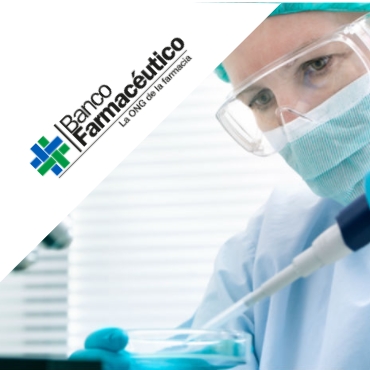
Banco Farmacéutico
Banco Farmacéutico is an NGO created in 2005 that works to promote the social inclusion of people through their health and to respond to pharmaceutical poverty.
LEARN MORE -

Barcelona Health Hub
Barcelona Health Hub is an association that works to promote innovation in digital health and its transfer to the sector.
LEARN MORE -
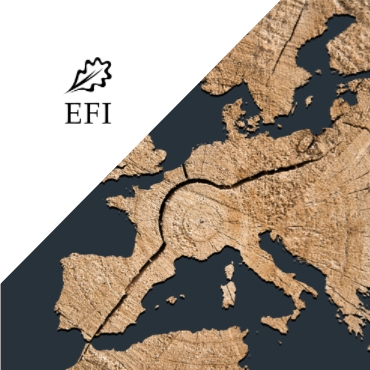
EFI
An international organisation, the European Forest Institute (EFI) conducts research and provides policy support on issues related to forests.
LEARN MORE -

EMEA
The Euro-Mediterranean Economists Association (EMEA) is an independent research and prospecting forum.
LEARN MORE -

EURORDIS
The mission of EURORDIS – Rare Diseases Europe is to work across borders to improve the lives of people affected by a rare disease.
LEARN MORE -
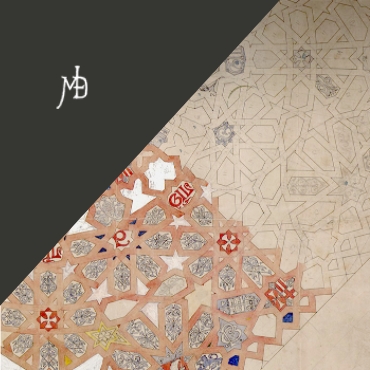
Lluís Domènech i Muntaner Foundation
Created in 2006 with the aim of recovering, studying and disseminating the personality and work of Lluís Domènech i Montaner.
LEARN MORE -
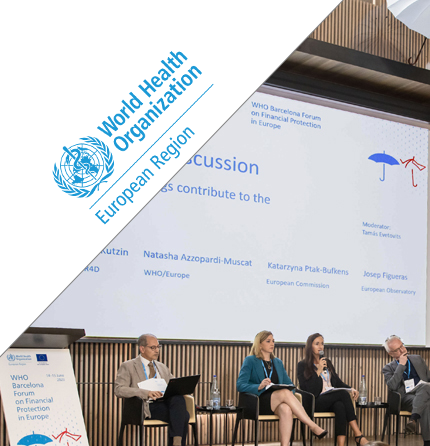
WHO
The WHO Barcelona Office is a centre of excellence in health financing for universal health coverage. It works with Member States across WHO’s European region to promote evidence informed policy making.
LEARN MORE -

UN-HABITAT
The City Resilience Global Programme UN-Habitat works with cities and territories to assist them on their resilience journey and secure a sustainable urban future for all.
LEARN MORE
Banco Farmacéutico
Banco Farmacéutico is an NGO created in 2005 that works to promote the social inclusion of people through their health and to respond to pharmaceutical poverty. The entity structures its action around three strategic pillars: conducting research to determine the economic and social consequences of pharmaceutical poverty, giving visibility to this problem and attending to people who cannot access medicines due to financial difficulties.

Barcelona Health Hub
Barcelona Health Hub (BHH) is a non-profit association that works to promote innovation in digital health and its transfer to the health sector. BHH encourages interactions between startups, healthcare organizations, corporations and investors to accelerate digital transformation in the healthcare industry. The Hub is an international reference centre in digital health, attracting innovation and talent.

EFI
An international organisation, the European Forest Institute (EFI) conducts research and provides policy support on issues related to forests. The Barcelona Office hosts three facilities: EFI’s Mediterranean Facility (EFIMED), which focuses on Mediterranean forests and forestry, providing science-based knowledge and expertise through capacity building, networking and policy support; the Genetic Resources Facility (EFIGEN), which hosts the long-standing EUFORGEN programme to promote the conservation and sustainable use of forest genetic resources in Europe; and the International Partnerships Facility (IPF), a global centre of knowledge and expertise that supports policy and governance reforms to fight illegal logging and deforestation around the globe.

EMEA
The Euro-Mediterranean Economists Association (EMEA) is an independent research and prospecting forum. It develops integrated analysis projects of political, social and economic factors in the Euro-Mediterranean region. It works in collaboration with the European Union, the Union for the Mediterranean, universities, think tanks and financial institutions.
www.euromed-economists.org

EURORDIS
The mission of EURORDIS – Rare Diseases Europe is to work across borders to improve the lives of people affected by a rare disease. This non-governmental alliance represents more than 800 rare disease patient organizations in 70 countries.

Lluís Domènech i Muntaner Foundation
Created in 2006 with the aim of recovering, studying and disseminating the personality and work of one of the most decisive and emblematic Catalan figures of the second half of the 19th century and the first quarter of the 20th century, the Lluís Domènech i Montaner Foundation promotes the work of the architect of the Sant Pau Art Nouveau Site.
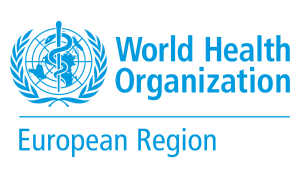
WHO
The WHO Barcelona Office is a centre of excellence in health financing for universal health coverage. It works with Member States across WHO’s European region to promote evidence informed policy making. The Office supports countries to develop policy, monitor progress and design reforms through health system problem diagnosis, analysis of country-specific policy options, high-level policy dialogue and the sharing of international experience. It is also home for WHO training courses on health financing and health systems strengthening for better health outcomes.
https://www.who.int/europe/teams/office-for-health-systems-financing-(barcelona)

UN-HABITAT
The City Resilience Global Programme UN-Habitat works with cities and territories to assist them on their resilience journey and secure a sustainable urban future for all. The CRGP works on technical cooperation, advocacy, and knowledge creation to increase local capacity for resilience. It secures an environment that encourages and allows cities and territories to become more resilient. Asunción in Paraguay, Barcelona in Spain, Dakar in Senegal, Tunis in Tunisia and Teresina in Brazil are just some of the cities that have worked with UN-Habitat’s CRGP over the past decade. The website includes more examples and many of the lessons learned through their experience.
You want to know more?
-
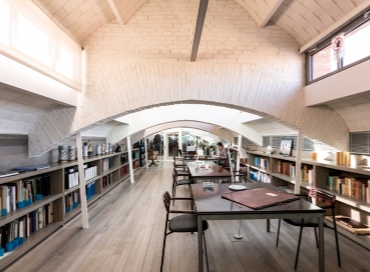
Become a friend
The Program Friends of Art Nuveau allows residents of the Sagrada Família, Guinardó, Baix Guinardó and Camp de l’Arpa neighborhoods to access Sant Pau for free throughout the year, among other benefits. + INFO -

Contact
Sant Pau is currently a unique work environment available to companies and institutions. If you want to know more details about the characteristics of the spaces that the Recinte Modernista can offer to your project or organization. + INFO -

Social and environmental programme
The educational program includes, in addition to the free and guided visit, three activities aimed at primary, secondary and high school cycles for delve into specific aspects of the old Sant Pau Hospital. + INFO -

Who are we?
Sant Pau hosts a series of leading institutions in the fields of sustainability, health and education, among others. These organizations develop their own programs and projects in the Modernista Precinct, and also undertake joint initiatives with the aim of providing answers to the challenges of society in the 20th century. + INFO -

Services
+ INFO -
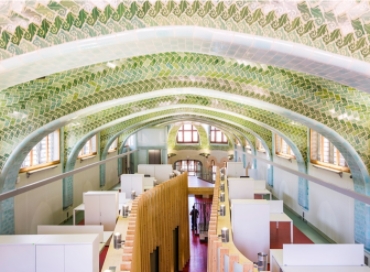
Resident organizations
The old modernist buildings are today modern and functional work spaces. + INFO



 Tickets
Tickets


